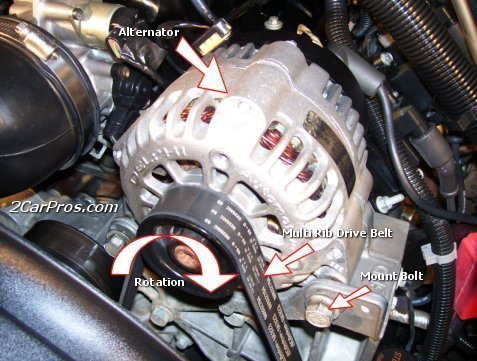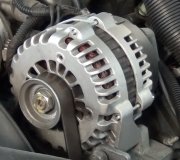From your description, it sounds like the plastic insulator is stripped and the nut inside is loose. That insulator is square on the outside and sits in a square hole in the rear cover casting. The stud is a bolt with a square under the head that mates with a square hole in the insulator. One of those squares on the insulator must be rounded, allowing the bolt to rotate. To fix that you would have to pull the rear cover off to tighten the nut while holding the bolt from the outside. That is a real difficult job that is going to end in a pile of teers. GM had, in my opinion, the world's second best generator design up through the '86 model year. They redesigned them for '87 models and really messed it up. Every year I had my Automotive Electrical students take generators apart to see how they work and how to repair them. We never got one of these apart without destroying internal parts. In fact, the message below is from the service manual.
Even if you could get inside to tighten the nut, the stud is likely to spin again next time you try to remove the fat output wire.
There's two things to be aware of with this generator. First, due to their design, they develop huge voltage spikes that can destroy the internal diodes and voltage regulator, and interfere with computer sensor signals. The battery is the key component in damping and absorbing those harmful spikes, but as they age and the lead flakes off the plates, they lose their ability to do that. This leads to multiple generator failures, often four to six in the life of the vehicle. To reduce that number of repeat failures, always replace the battery at the same time, unless it is less than about two years old. The old battery will work fine in an '86 or older model.
Second, always compare prices at the auto parts stores for the various warranty options. My friend is on his fourth generator for his '99 Suburban. He found a professionally rebuilt unit for $200.00 with a one-year warranty, and one with a lifetime warranty from a different rebuilder for only $150.00. Thanks to that lifetime warranty, his last replacement didn't cost him anything.
GM has had a history of designing large assemblies that they don't want repaired in the field. They want you to buy the whole assembly. This goes back to their very nice HEI distributors and their second generation generators. It was always the aftermarket suppliers that developed the tools and methods of repairing the assemblies rather than replacing everything, then they came up with the replacement parts. This warning message was from GM. Today it is possible to find rebuild kits at farm and home stores and some auto parts and hardware stores. The kit at my local store costs over $75.00 and includes the front bearing, (another common failure), the rear bearing, the diode block and a new voltage regulator and brush assembly. There is no way in the field to test the voltage regulator, so you would want to replace it rather than risk having to do the job all over again. The thin, flimsy metal tabs on the diode block break off when trying to unsolder the wires through them, through the holes in the housing. There's no practical way to repair that, so it gets replaced too. By the time you're done, the unit still might not work, so all that time and money is wasted. We never repair generators and starters for our customers because they will only remember and blame us if the repair goes sour in a few days, plus, it doesn't save them any money. People like me always DO repair these assemblies for ourselves, but this is one item that doesn't pay to try. You have to bite the bullet and just spring for a rebuilt generator. If you want to try to do this yourself, I'll keep my fingers crossed and jump joyously with you if you're successful, but the odds are against that. Even my local starter / generator rebuilder won't repair these. He will sell you the parts, but it won't save you anything over the kits at the farm and home stores.
Let me know how you want to proceed and I'll help you in any way I can.
Image (Click to make bigger)
Wednesday, November 9th, 2022 AT 7:50 PM




